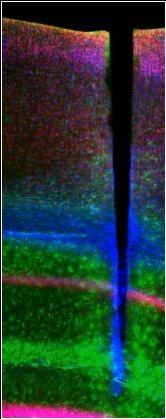|
Recent work from our lab demonstrated that the foreign body response to implanted devices extends beyond local tissue changes. For example: the dentate gyrus of the hippocampus is an area of the brain that continually generates new neurons through adulthood, but this process can be diminished by inflammatory signals from elsewhere in the body. Our group has found that neurogenesis is reduced by the presence of chronically implanted, cortical electrodes, and is more severely reduced by electrodes that have a larger inflammatory footprint. This reduction in neurogenesis in the hippocampus could explain the progressive cognitive impairment observed in patients implanted with deep-brain stimulation electrodes and hydrocephalic shunts.
Recent Poster:
Reducing the Inflammatory Footprint of a Chronically Implanted Microelectrode Array Reduces its Impact on Neurogenesis
Recent Publications:
Winslow, BD, Hinckley, P, Skousen, JL, Merriamise , KD and PA Tresco. (2010) Reducing the inflammatory footprint of a chronically implanted microelectrode array reduces its impact on hippocampal neurogenesis, 40th Annual Society for Neuroscience, San Diego, CA.
Winslow, BD and PA Tresco. (2009) The foreign body response to CNS Implants is accompanied by decreased neurogenesis in the hippocampus. Society for Biomaterials Annual Meeting, Seattle WA, April.
Winslow, B, Merriam, ME, Perlin, G, Wise, KD and PA Tresco, (2009) Chronic microelectrode implantation is accompanied by decreased neurogenesis in the dentate gyrus, 39th Annual Society for Neuroscience, Chicago, Ill. |
|
Neurogenesis |




|
The Keck Center for Tissue Engineering |

